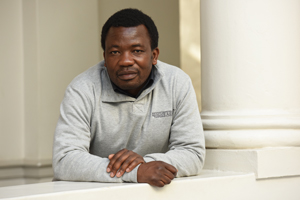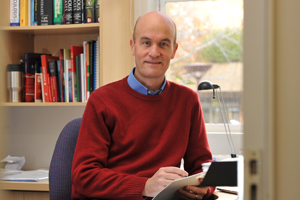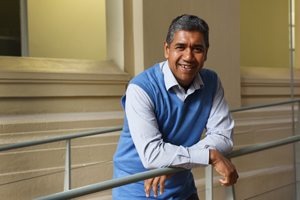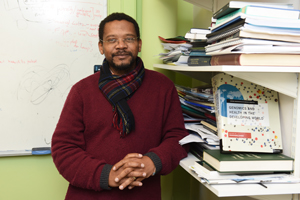New professors share journeys and reflections

How long does it take to become a professor? Following UCT’s recent ad hominem promotions and as the university works to transform its academic cohort, this question is a moot point. Ten candidates share their journeys … Read more.
Four of these candidates are from Health Sciences:
Professor Collet Dandara, Division of Human Genetics: “13 years post PhD”

"How long it takes to become a full professor? It depends on when one starts counting. I completed my PhD in 2003, thus it took me 13 years, and if I include time for PhD training, that’s a good 17 years. I completed my PhD at the University of Zimbabwe after a stint at the Karolinska Institute (Huddinge Hospital), Stockholm, as part of my PhD training.
“The route is not linear. But all the requirements outlined for ad hominem promotions should assist one to map a path to full professor. However, one has to find a research niche that is relevant and that will lead to publications.”
“One of the issues is support in certain activities. My strong area was research, where I was well supported by the Emerging Researcher Programme at UCT and later by the SAMRC [South African Medical Research Council] and NRF. Without research support, you cannot progress. This means you can’t recruit students, you can’t write manuscripts and obviously can’t attend conferences – all major contributors to promotion.”
“However, even as much as the research is supported, there are certain areas, for example, sitting on committees or leading the department or division, which are out of a candidate’s own control. Rotational positions give opportunities to a wide range of people to participate in various administrative activities. Rotational positions give different people opportunities to lead and introduce their philosophies and such change revitalises organisations.”
“To young and emerging staff, I would say: ‘Work hard on the three aspects under your direct control: research, teaching and social responsiveness ... Once your research is very strong, your visibility will be difficult to ignore, and will lead to nominations for committees, and so on.’ ”
“Surprisingly, I’m working even harder than before. I feel it’s my students who’re also enjoying the full professorship, especially my role modelling.”
“I’ve been married for 20 years. My wife took most of the pressure looking after our children. I think if you want family, you need a strong and supportive partner.”
Professor Graeme Meintjes, Department of Medicine: “the 20-year clock started ticking well before PhD”

“I obtained my PhD in 2011. My route was definitely not linear. Prior to obtaining my PhD I had published a substantial amount of original research. I had specialised in medicine and subspecialised in infectious diseases and had been involved in national and international clinical guideline development. I had also led an HIV/TB referral service at GF Jooste Hospital. So for me the ‘20-year clock’ did not start ticking when I obtained my PhD but well before that.”
“My advice for aspiring professors who are in their early careers is to identify a research area that allows you to carve a niche for yourself because it is novel or under-researched, and where the findings will potentially have a real impact in advancing your scientific field.”
“Align yourself with mentors and supervisors who can offer realistic guidance and strategic advice as you progress.”
Professor Muazzam Jacobs, Division of Immunology: “13 years from PhD”

“I got my PhD in June 2002, graduating from UCT. The journey could have taken less than 13 years if someone had told me what not to do. The route is definitely not as linear as some would believe.”
“It would have been easier knowing and understanding early how the system works.”
“To those from historically disadvantaged groups, be stubborn in your belief that you can achieve and function at the highest level. Never compromise.”
“To quote Mandela: ‘It always seems impossible until it’s done.’ ”
Professor Ambroise Wonkam, Division of Human Genetics: “Ten years after completing my physician specialist training”

“From the day I was recruited as a senior lecturer at UCT in 2009 to getting my professorship took six years. From the date of completion of my physician specialist training in medical genetics in 2005, it took ten years.”
“I don’t believe it could have been done in less time. An average of ten years should be the regular time for normally active academics to achieve full professorship in a normal and enabling environment.”
“Academic life is highly demanding and it’s unlikely to be a straight route. It requires a reasonable balance of research, teaching, administrative and social responsiveness activities. A fair amount of time is also devoted to grant writing and international travel, specifically in biomedical research, which is always very demanding on resources. Moreover, we all have families and social life to add to this.”
“A one-size solution for all isn’t possible. Among the four main areas of expertise in academia, each individual should determine their areas of strength and weakness and look for appropriate enabling or corrective action.”
“The UCT Research Office, through the Emerging Researcher Programme, was a great facilitator, providing some seed funding to establish ourselves before seeking international grants. Research support is core. It also directly influences teaching and the supervision of postgraduate students.”
“To be productive as a researcher at the beginning of your career, choose to publish in areas that don’t need massive funding but ideas and time, such as systematic reviews. The choice of the research niche is critical. I’d advise one to go for the frequent, specific and the most severe issues related to the place you live (it could be a disease or social disorder). Young researchers shouldn’t be shy to explore the less popular, ambitious and innovative hypotheses.”
“Above all, be humble and persistent.”
Read the full UCT story on here